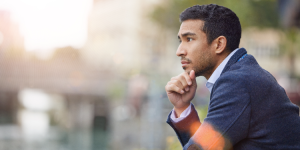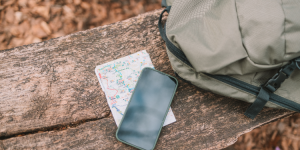
Lorraine has always loved travelling and started living abroad when she was barely 20 years old. However, she had never thought that one day she would be working with horses in the heart of Patagonia. She talks to Expat.com about her adventure in Argentina, from her arrival in Buenos Aires to settling in a small Southern village surrounded by nature.
Can you tell us about your life before Argentina?
As far as I can remember, I have always been travelling. I was lucky to have parents who liked to travel abroad for vacation, which helped me become open-minded and develop a strong passion for discovery.
During my psychology studies, I had the chance to study abroad for a year. That is how I was able to do my second year in Granada, Spain. It was a wonderful experience, very enriching, both personally and professionally. I experienced the ups and downs of expat life at the age of 20, and I was also able to grasp the differences in practice and care at the psychiatric level, depending on the country.
Finally, after graduating as a clinical psychologist, I moved to Lille, in the north of France, where I am from.
I worked in the field of my choice: victim support associations. It was very exciting.
However, I always had this desire to travel again and discover other countries, cultures, etc. So one day, I decided to leave my apartment and my job and travel. It all began with Argentina.
What made you want to settle in Argentina? Tell us about the background?
Argentina was not a trivial choice. I had not been here for more than thirteen years, and I was missing my family. Indeed, my father was born to French parents in Argentina. So as a child, I already had the experience of expat life. I had the chance to travel to Argentina three times to visit my uncles. So my initial idea was to spend the end-of-year holidays with my family and to travel again afterwards.
How was your arrival in Argentina?
Arriving in Buenos Aires, I was greeted by one of my parents' acquaintances. It turns out that a year ago, the son of one of their friends had moved to Argentina with his partner. So they welcomed me right away and facilitated my arrival in the country!
They were a real support to live the first weeks in Buenos Aires. They also helped me meet new people and create a social circle quickly.
Were you aware before leaving that you would not be able to practice as a psychologist in Argentina? What was your reaction to learning that?
I had no clue that I would not be able to work as a psychologist before leaving. In fact, the diploma is not recognized here, so I had to retake exams on the spot.
I first contacted the embassy to introduce myself and offer my services but in vain. No position matched my profile.
I also contacted psychologists in Buenos Aires to discuss my move in the medium/long term. In reality, I was not ready to work as a psychologist right away. I was myself going through great psychic upheavals (as expats we can have a lot of mixed feelings), and I did not feel like accompanying people in difficulty while I was having a very scattered experience.
I saw an ad on social media and applied to a language institute. I worked as a French teacher for a year.
How did this incredible project of getting into equine therapy come about, and why Patagonia?
I loved the year I spent in Buenos Aires. However, I had come to Argentina with the desire to travel. So, before returning to France for the end of year celebrations, I decided to quit my job as a teacher and fulfil my childhood dream: horseriding in Patagonia.
I have always loved horses. Since childhood, I have dreamed of being in contact with them in this immense Patagonia. So before return to France, I volunteered for a month in an estancia (a farm with herds of horses), in the heart of Patagonia. It was love at first sight! I could not get enough of the place, the lifestyle, the abundant nature, the daily life with the horses, and life in simplicity.
After a few months spent in France and travelling Europe, I still had Patagonia on my mind. So six months later, I booked a ticket back to Argentina, but this time with a specific project -- to retrain in equine therapy.
Long before becoming a psychologist, I had already dreamed of being an equine therapist. Argentina has the reputation of being a land of horses, and I was sure to find my happiness there.
Then came the pandemic, and I was locked down in Patagonia barely fifteen days after my arrival. Luckily, everything fell into place. I learned that an equine therapy centre had just opened in the small town where I live (the only one in the whole Province) and that they were building up a team. So I joined them and started working in the Educational and Therapeutic Center of El Calafate! A year later, I graduated and officially became part of the team.
What does your everyday life as an equine therapist look like?
My everyday life starts with equine therapy sessions, recreational riding sessions for children under six, online psychiatric consultations as well as the French lessons that I still give to certain students.
In a single day, I often go back and forth from my home to the center! Along with the team, I also take care of the horses, feed them, clean their living space, the facilities, etc.
My daily life is, therefore, very varied because I work with different audiences. In equine therapy, I mainly provide support to Argentinian children with autism spectrum or behavioural disorders. In my online consultations as a psychologist, I provide support for French adults who are experiencing difficulties related to their move abroad or particular moments in life (anxiety, separation, family problems, difficulty at work, etc.). Finally, during my French lessons, I work with people from all over the world.
This project must have impacted the life you had in Buenos Aires. Can you tell us about it?
Life in the capital is very different from that in Patagonia. Today, I am surrounded by nature, lakes and mountains in particular. The climate is also different. In Patagonia, it's not so easy to face the cold and the wind every day! Also, we are relatively isolated, the first town being 350km away. Finally, Calafate is a small pueblo where everyone knows each other. Here you have to adapt to the specificities of a village lost in nature. It's a totally different rhythm, a different kind of relationship with others, fewer needs. In short, you're back to basics.
It's quite difficult to get used to it. You have to find your place and confront yourself with the life you have chosen. After two years, I can say that I love this lifestyle and I'd rather be here than in any capital!
Can you imagine yourself working somewhere else and doing another job today?
I don't see myself doing a job other than a psychologist or horse therapist. These two professions are now part of my balance. However, I'm totally open to the idea of working elsewhere! I'm still willing to travel. Who knows, maybe the future holds some pleasant surprises for me!
Do you have any advice for anyone who would like to come and live in Argentina? What do you love most about your new life and your new country that you would like to share with them?
Living in Argentina means dealing with a real (but amazing) culture shock. Life is simple there, the D system is omnipresent, and the Argentines are open, welcoming and very generous. However, the ongoing difficulties in the country's economy affect everyday life. Here, there is no long-term vision, which is both liberating and, at the same time, a source of anxiety for some of us!
If you have a local job or are a digital nomad with an activity that allows you to earn in another currency than that of Argentina, then do not hesitate! The country has a lot to offer. You might also "jugarsela" and come and try your luck. In Argentina, nothing is impossible!



















